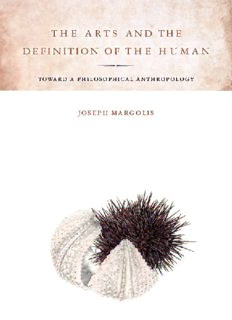
The Arts and the Definition of the Human: Toward a Philosophical Anthropology PDF
Preview The Arts and the Definition of the Human: Toward a Philosophical Anthropology
The Arts and the Definition of the Human The Arts and the Definition of the Human Toward a Philosophical Anthropology Joseph Margolis Stanford University Press Stanford, California Stanford University Press Stanford, California © 2009 by the Board of Trustees of the Leland Stanford Junior University. All rights reserved. No part of this book may be reproduced or transmitted in any form or by any means, electronic or mechanical, including photocopying and recording, or in any information storage or retrieval system without the prior written permission of Stanford University Press. Printed in the United States of America on acid-free, archival-quality paper Library of Congress Cataloging-in-Publication Data Margolis, Joseph, 1924– The arts and the definition of the human : toward a philosophical anthropology / Joseph Margolis. p. cm. Includes bibliographical references and index. ISBN 978-0-8047-5953-3 (cloth : alk. paper) — ISBN 978-0-8047-5954-0 (pbk. : alk. paper) 1. Painting—Philosophy. 2. Art—Philosophy. 3. Visual perception. 4. Aes- thetics. 5. Philosophical anthropology. I. Title. ND1140.M338 2009 750—dc22 2008018850 Typeset by Bruce Lundquist in 11/13.5 Adobe Garamond for Coco, amazed together Contents Preface ix Prologue: The Definition of the Human 1 1 Perceiving Paintings as Paintings 29 2 “One and Only One Correct Interpretation” 71 3 Toward a Phenomenology of Painting and Literature 97 4 “Seeing-in,” “Make-Believe,” “Transfiguration”: The Perception of Pictorial Representation 123 Epilogue: Beauty, Truth, and the Passing of Transcendental Philosophy 145 Notes 161 Index 179 Preface A young frienD of Mine who lives and works in Madrid and who knows my published views very thoroughly recently sent me the draft of a longish paper of his in which, rather generously, he reviews some themes of mine, featuring in particular my having said that although Homo sapiens is a “natural-kind” kind, human beings—human selves—really have no na- ture, are no more than artifacts, histories, hybrids of biology and culture, the sites of certain transformed powers peculiar to human possibility. That single idea is as close to the pivot of my best intuition as anything I can think of. It was indeed the unmarked focus of a book my young friend had reviewed, as well as the somewhat more explicit but still decentered focus of the book before you now, a notion translated into the puzzles of the art world, very far removed in an academic sense—but not really—from the moral/political topics of the earlier book. I can’t say that I’ve chosen this conception of the self for my own; it’s nearer the truth to confess that it’s captured me, as I imagine will be clear enough when you read on. It’s been shaping my thought over the span of an entire career, deployed I realize in every philosophical niche that has caught my interest. So that now it’s a broadly unified conception, still somewhat elusive, which, though hardly orthodox, I’ve tried to demon- strate is a most resourceful replacement for many a canonical philosophy able to command a sizable fiefdom. I’ve been at these inquiries too long to be unaware of my direction. I’ve been retracing my steps back from the distinctive compartmentaliza- tions of philosophical topics that hold sway in our time and that have put ix
Description: